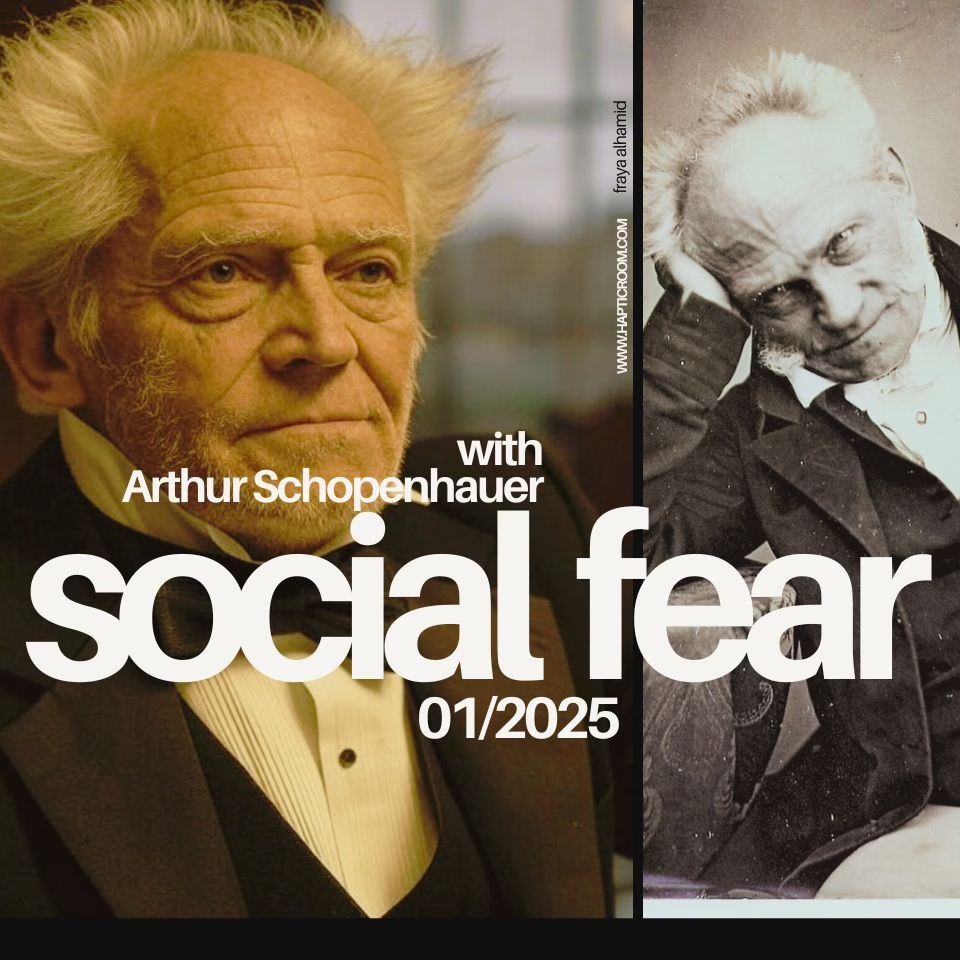Homo Quarens. That’s what humans have turned into, the human of inquiring. After centuries, and centuries from just a simple homo sapiens (the wise), homo faber (the working human), and more on the list we’ve created. We evolved into a species full of questions and anxiousness. Nothing seems right and we soon falter from anxiety, to social fear when witnessing a different side or contradicting matters that affect our abstraction of thoughts.
The Concept of Anxiety
Depression and anxiety almost, always, go hand in hand. The causality of each other, back to back, reached the worst part of our life. Anxiety was written first not in the minds of psychologists that we all know, who have calculated it into a scientific diagnosis in the third edition of DSM, started in 1980. Rather, anxiety was first recognized around 1946 from the writings of Soren Kierkegaard, a renowned philosopher in his book The Concept of Anxiety. It was closer to the angle of religious views than a psychological perspective.
Kierkegaard blamed how freedom originates the anxiety due to the probability of sinning. It pointed out that faith can resolve the “dizziness of sin” (as Kierkegaard calls anxiety) by its relationship with God. At the right proportion, anxiety is a built-in alarm to create better decisions and prevent the wrong ones. When it creeps outside our solitude, it could create social fear.
Social Fear and Circumstances
Curiosity can devour our sense of security at an extreme dose. It leads to merely nothing but bottomless pit of considering ourselves the not-knowing creatures particularly when facing strangers. We assess circumstances, surroundings, and what opportunities or threats it possesses in social settings to be prepared for interactions. We ask questions to ourselves before exchanging meanings with others. How to become relatable with each other. Become seen and perhaps even validated in the long run. What can we compensate for them to engage further? What do we gain from it? Our amygdala won’t stop yapping and asking questions due to our limited knowledge of what the future holds. And that’s also the spot where social anxiety arose.
Social anxiety is a state where subconscious-driven trauma acts on our body. It commands our hearts to beat faster, our cheeks to blush, our sweat to drip and our voices to tremble. However, this article does not go into deep into the psychological reasoning of why or how to manage social fears in everyday life. We would go into a different perspective this time, a more philosophical one. Kierkegaard might endorsed a religious perspective to manage it, a leap of faith he shall say, but it only appeals to the religious. While Arthur Schopenhauer sees it in a more inclusive, considerable coping system.
Schopenhauer Explains The Blind Will
Arthur Schopenhauer, who lives in the same era as Kierkegaard once elaborated on how we perceived the world as representation. As explained in one of his writings, The World as Will and Representation in the year 1858 (Translated by E.F.J Payne), representation here is how we understand certain phenomena of the world. The representations can transcend, but it is not an illusion or fakeness, rather it is a series of representations whose the common bound is the ‘principle of sufficient reason. (Schopenhauer, Vol.1, 1958:15) The world of will is the subject of the principle of sufficient reason. It is not the will itself, because subjects disobeyed the principle of sufficient reason. This tells us that, the most inner core of our representations. Most of it can be groundless or meaningless in a noumena world. Knowing this, what does it have anything to do related to the basis of social fear?
Is Social Anxiety The Ignored Principle of Sufficient Reason?
The blind will as explained by Schopenhauer in The World as Will and Representation (Die Welt als Wille und Vorstellung) is a driven-force to what plural characters of human being. The will that expresses and keeps starving for the quest, can have insecurities and other thoughts from the ignored sufficient reason. Thus, our need to socialize keeps battling this fear of being judged, and might even neglect our actual need for solitude. Social fear is when humans forge their self-identity into circumstances they are not willing to. The chance of an individual being able to initiate ideas and act on decisions of contemplation in non-social settings or situations nowadays seems redundant, pitiful, and seemingly a bridge to being an outcast.
Not only subconsciously eats your self-esteem, social fear also distorts the sufficient reason with its will to live. This part of the misery in life ravished greedily, and with all seriousness came from the will to life or wille zum Leben. This seriousness is what is dubbed the social anxiety. The good news is you are not the only being that has it. Most humans possess this blind force, particularly in the romantic life.
Solitude: A Consolation of Social Fear
Perhaps social fear has bothered and haunted you for most of your life and is considered a disorder by social conventions. But it could be just an alert of what humans uphold outside the norms, and social skills to fit in with the majorities. Schopenhauer continues to understand this as options. He offered his usual, blunt words of wisdom, at the same time, also true. A remedy for the social fear that you might discover amidst being surrounded by other people ;
“When you find human society disagreeable and feel yourself justified in flying to solitude, you can be so constituted as to be unable to bear the depression of it for any length of time, which will probably be the case if you are young. Let me advise you then, to form the habit of taking some of your solitude with you into society, to learn to be to some extent alone even though you are in company; not to say once what you think, and, on the other hand, not to attach too precise a meaning to what others say; rather, not to expect much of them. Either morally or intellectually, and to strengthen your self in the feeling of indifference to their opinion, which is the surest way of always practicing a praiseworthy toleration..”
Schopenhauer then continues “..If you do that, you will not live so much with other people, though you may appear to move amongst them, your relation to them will be a purely objective character. This precaution will keep you from too close contact with society, and therefore secure you against being contaminated, like a fire–the wise man warming himself at a proper distance from it; not coming too close, like the fool, who, on getting scorched, runs away and shivers in solitude, loud in his complaint that the fire burns.” (Counsels and Maxims).
Between Solitude or Taking Control of Social Fear
So, it is a matter of personal prerogative, which one you prefer? Living in solitude like monks in a monastery that would never allow bitter judgment? Respected and accepted by the norms ?, Or prepare yourself with the knowledge that free will never exist? Only our intellect would have to maintain distance as Schopenhauer had explained above. To be able to control our constant will to seek a sense of belonging, which leads to attachment and desire to live with others, despite the nervous sweat drips, breathing uncomfortably, and hysteria of social circumstances.
The Marquet Incident
The infamous story that caused Schopenhauer to fall deep into a notorious reputation is the marquet affair. This has significantly bound to Schopenhauer’s irritability to people. It made his features became close to confirming that he is a peculiar, hostile, cold man. It was never made known to the public a different angle, that certain noises in inevitable conditions might made Schopenhauer jittery. It caused him to act not on behalf of his own principle of reason, but rather the driven force of human impulse who loathed the loud voice of an infuriating woman.
Her name was Caroline Louise Marquet. She was a seamstress gossiping with a blaring voice just outside Schopenhauer’s apartment door. When Schopenhauer displays his dismay in telling them to leav. Marquet then shows resistance and says that she is a decent person. They were later involved in an altercation that led to the lady being pushed out of the apartment until she stumbled down.
Obit Anus Abit Onus
Marquet sued Schopenhauer and finally won, resulting in a fine of twenty thalers of fine. It did not stop there, the case extended as Caroline Marquet made a comeback of the same legal case in 1825 filing that due to the incident, she was unable to perform her duties and demanded an annual allowance from Schopenhauer as a consequence of what his actions have brought to her. The drama stopped 20 years later when Marquet had died. Obit Anus Abit Onus as Schooenhauer’s comment that meant “the old woman has died, the burden is lifted.”
This story sums up, yet clarifies what Schopenhauer had observed and wrote in his essays on people. It explains how humans can somehow misbehave which leads most of us into social fear in dealing with them. Nevertheless, it seems that Schopenhauer had quite sorted it out, didn’t he?
“A high degree of intellect tends to make a man unsocial”
Arthur Schopenhauer, The Wisdom of Life and Counsels and Maxims
References :
Schopenhauer, Arthur , The World as Will and Representation, 1818
Schopenhauer, A. (1890). Counsels and Maxims.
Janaway, C. (2010). Schopenhauer: “The World as Will and Representation”: Volume 1. Cambridge University Press.
Essays of Schopenhauer, https://www.lecturesbureau.gr/1/author/e7/?lang=en. (2023, April 7). The woman who greatly irritated Schopenhauer (Arthur Schopenhauer).
Soren Kierkegaard. (2014). The Concept of Anxiety: A Simple Psychologically Oriented Deliberation in View of the Dogmatic Problem of Hereditary Sin. W. W. Norton & Company.
Visuals of Schopenhauer :
Eberhard Mayer-Wegelin, Frühe Photographie in Frankfurt am Main 1839-1870, 1982, Nr. 10.
Grok AI
Author: Fraya
A writer and entrepreneur with profound interest in humankind research and insights. An avid coffee drinker and book hoarder. Hours and days spent in Jakarta.The Haptic Room is supported by our readers. Our site may contain links to affiliate websites, and if you make a purchase through these links, we receive a commission to support our site.

